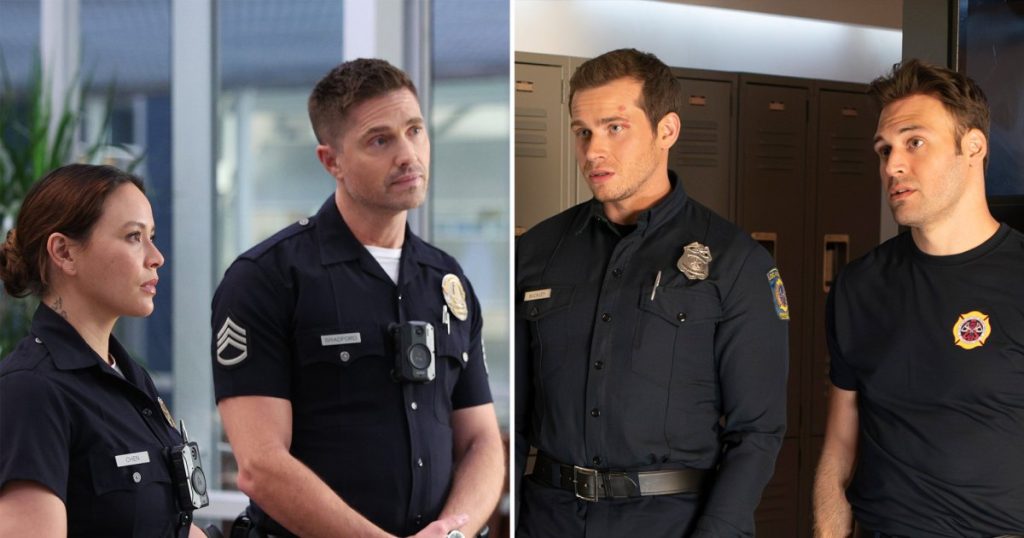The potential for a crossover between two popular first responder dramas, “The Rookie” and “9-1-1,” has been a topic of speculation among fans. Both shows depict the lives and challenges faced by emergency personnel in Los Angeles, leading to the natural assumption that their paths might cross within the same fictional universe. However, “The Rookie” showrunner Alexi Hawley has effectively dismissed this possibility, citing logistical and narrative complexities that would arise from such an integration. Hawley’s primary concern revolves around the inherent expectation of continuous interaction between the characters of both series if they were to exist within the same fictional Los Angeles. He argues that once the crossover precedent is established, it becomes difficult to justify the lack of frequent encounters between characters who operate within the same city and often respond to similar emergencies. This continuity issue presents a significant hurdle in maintaining the individual identities and narrative arcs of each show.
The journey of “9-1-1” has been marked by network transitions and spin-off expansions. Initially premiering on Fox in 2018, the series, starring Angela Bassett and Peter Krause, garnered a loyal following with its compelling portrayal of the intertwining professional and personal lives of Los Angeles first responders. However, despite its success, Fox made the surprising decision to cancel the show in 2023. ABC, recognizing the show’s potential, swiftly picked up “9-1-1” for a seventh season, ensuring its continuation. This network shift highlights the competitive landscape of television programming and the value placed on established franchises. Meanwhile, “9-1-1: Lone Star,” a spin-off centered around a New York firefighter’s relocation to Texas, experienced a different fate. Despite airing on Fox alongside its parent series, “Lone Star” was renewed for a fifth and final season in 2023, suggesting that the spin-off, despite featuring a notable cast including Rob Lowe, did not achieve the same level of sustained viewership as the original series.
The “9-1-1” franchise, however, demonstrates a resilient spirit of expansion. Co-creators Ryan Murphy, Brad Falchuk, and Tim Minear have hinted at the possibility of a new spin-off set in another location, indicating their intention to further explore the world of first responders in different geographic contexts. This strategic approach allows the franchise to diversify its narratives and potentially tap into new audiences while maintaining the core elements that resonated with viewers in the original “9-1-1” series. The success of the franchise model in television often relies on the ability to balance familiarity with novelty, and the “9-1-1” creators appear to be navigating this challenge by expanding the universe while preserving the essence of the original concept.
“The Rookie,” which also premiered in 2018, focuses on the lives of police officers in Los Angeles. The show distinguishes itself by following the journey of John Nolan, played by Nathan Fillion, a character who makes a significant career change later in life, becoming a rookie police officer. This unique premise, centered around a midlife career shift, resonated with audiences and provided a fresh perspective on the police procedural genre. Similar to “9-1-1,” “The Rookie” has also ventured into the realm of spin-offs. Showrunner Alexi Hawley is developing a new series set in Washington state, revolving around a male cop embarking on a new chapter. This echoes the central theme of the original “The Rookie,” suggesting a potential thematic continuity within the expanding universe. However, the first spin-off, “The Rookie: Feds,” which premiered in 2022, was canceled by ABC after a single season, highlighting the challenges of successfully launching spin-off series, even within established franchises.
The differing trajectories of “The Rookie” and “9-1-1,” and their respective spin-offs, underscore the complexities of navigating the television landscape. While both shows explore the lives of first responders in Los Angeles, their narrative approaches, network affiliations, and overall success have diverged. “9-1-1,” despite its network switch, has maintained a strong presence and continues to explore new avenues for expansion. “The Rookie,” on the other hand, while continuing its main storyline, has faced challenges in establishing its spin-off ventures. These contrasting experiences highlight the unpredictable nature of the television industry, where even established franchises can encounter unforeseen hurdles. The success of a series, and its potential for expansion, often hinges on a multitude of factors, including audience reception, network support, and creative decisions.
The diverging paths of these two first responder dramas also underscore the strategic decisions made by networks regarding their programming lineup. ABC’s decision to acquire “9-1-1” after its cancellation by Fox demonstrates a calculated risk based on the show’s established audience and proven track record. Conversely, the cancellation of “The Rookie: Feds” suggests a more cautious approach, prioritizing profitability and viewer engagement. These decisions reflect the competitive nature of the television industry and the constant need to adapt to evolving audience preferences and market dynamics. The success or failure of a series can have significant implications for network programming strategies, often leading to adjustments in scheduling, marketing, and even the development of new content. The interplay between creative vision, audience reception, and network decisions ultimately shapes the landscape of television programming and determines the longevity of individual series.

